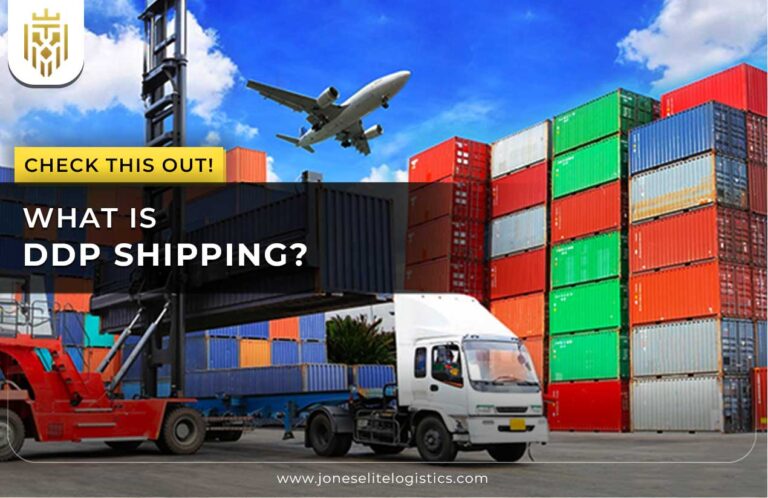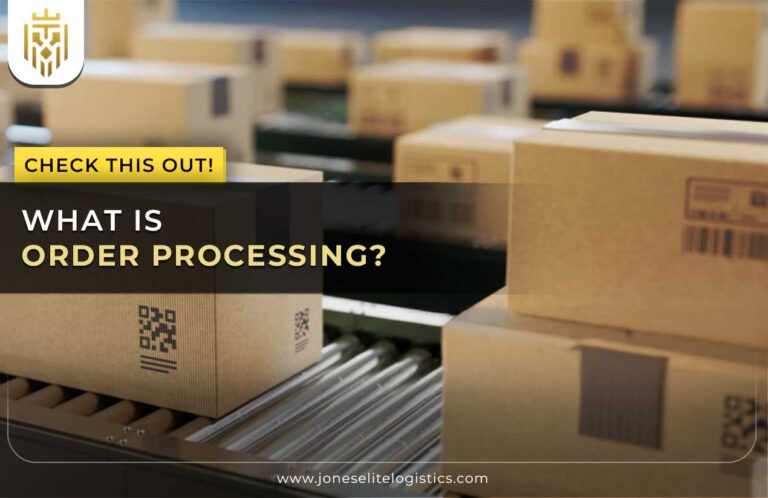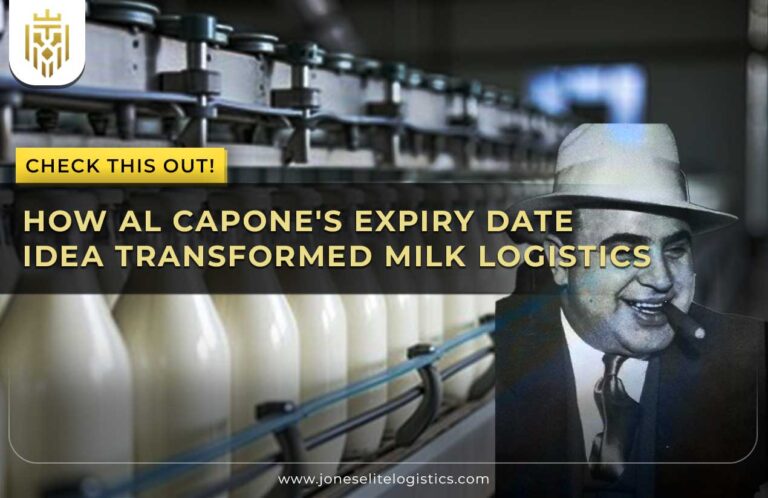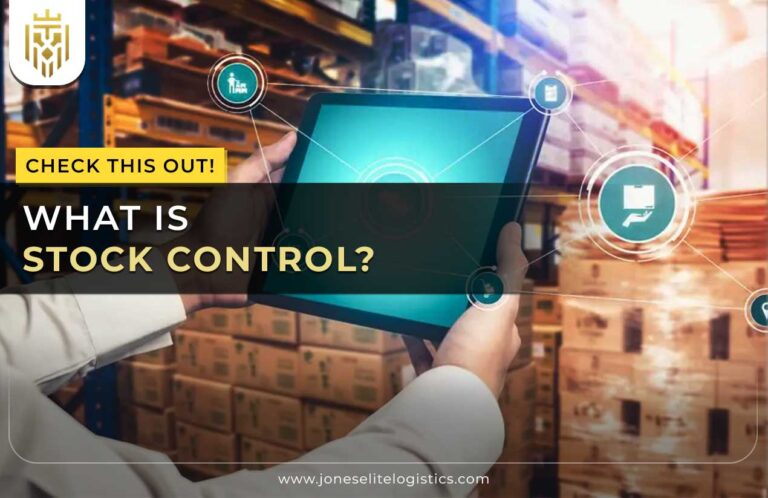What is Logistics Management?
Logistics Management is the strategic coordination of goods movement and storage, optimising resources across sourcing, planning, transportation, and inventory. The logistics management meaning highlights its role in maximising profits while meeting customer needs efficiently. To learn logistics management, understanding these components is essential for seamless shipping and logistics.
Importance of Logistics Management:
The importance of logistics management lies in safeguarding goods during transit, improving profitability, and enhancing supply chain logistics through optimised routing and intermodal operations. Effective logistics solutions enable sustainable practices, reduce costs, and ensure timely deliveries for industries like retail logistics and e-commerce logistics.
Functions of Logistics Management:
The functions of logistics management include order processing, material handling, demand forecasting, packaging, inventory management, transportation, and order fulfilment, ensuring efficient operations across the supply chain logistics and enhancing customer satisfaction.

Order Processing:
Order processing ensures seamless handling of goods across the supply chain logistics, verifying, fulfilling, and managing customer orders. This function of logistics management improves efficiency in last mile logistics, resulting in higher customer satisfaction through timely and accurate deliveries.
Material Handling:
Material handling is a critical function of logistics management, involving the safe, cost-efficient movement of goods across the supply chain management. Essential for transport and logistics, it ensures products remain undamaged while being transported across various stages.
Demand Forecasting:
Demand forecasting enhances e-commerce logistics by optimising supply chain logistics, minimising lead times, and reducing costs. The logistics management definition highlights it as a crucial part, as it addresses capacity needs, mitigates disruptions, and ensures seamless product availability for customers.
Packaging:
Logistics solutions for packaging focus on protecting goods during transit, optimising space, and utilising sustainable materials. A crucial function of logistics management, packaging enhances safety for shipping and logistics, particularly for fragile or hazardous materials.
Inventory Management:
At the heart of supply chain management, inventory management ensures the right product availability while balancing cost-efficiency. As a key function of logistics management, it supports retail logistics and last mile logistics by streamlining product flow and replenishment.
Transportation:
Transportation, a core function within logistics management programs, includes route planning, cost optimization, and integration with inventory systems. Using data analytics and TMS tools, transport and logistics becomes more efficient and the flow of goods is also improved through supply chain management.
Order Fulfilment:
Inventory management, packing, shipping and customer communication are all wrapped up into the order fulfilment process, making it smooth for delivery.This Logistics Management meaning is crucial for e-commerce logistics to improve operations efficiency and customer satisfaction.
Types of Logistics Management:
The main types of logistics management are supply chain management, product management, returns management, customer service management, and distribution/material handling, focusing on optimising goods movement and supporting industries like retail logistics and e-commerce logistics.

Supply Chain Management:
Supply chain management, a core aspect of logistics management, streamlines planning, sourcing, and delivery to meet customer needs. It incorporates inbound, outbound, and reverse logistics, ensuring smooth operations in shipping and logistics.
Product Management:
Product management ensures safe goods transportation within and between warehouses, enhancing efficiency in supply chain logistics. This function of logistics management emphasises maintaining product quality and supporting retail logistics.
Returns Management:
Returns management facilitates reverse logistics by tracking returned goods, deciding their reuse, and improving customer loyalty. It aligns with supply chain management to support seamless processes in e-commerce logistics and retail logistics.
Customer Service Management:
This aspect of logistics management ensures timely, damage-free product delivery to meet customer expectations. A critical part of last mile logistics, it enhances satisfaction and strengthens brand reliability.
Distribution and Material Handling:
Distribution and material handling focus on moving goods from suppliers to manufacturers or manufacturers to distributors. Essential for transport and logistics, these activities ensure seamless storage, tracking, and delivery in supply chain logistics.
Tips for Effective Logistics Management:
Effective logistics management involves optimising transportation, inventory, and routes using technology like TMS and data analytics, planning ahead, and balancing cost and safety to streamline supply chain logistics and meet customer expectations.
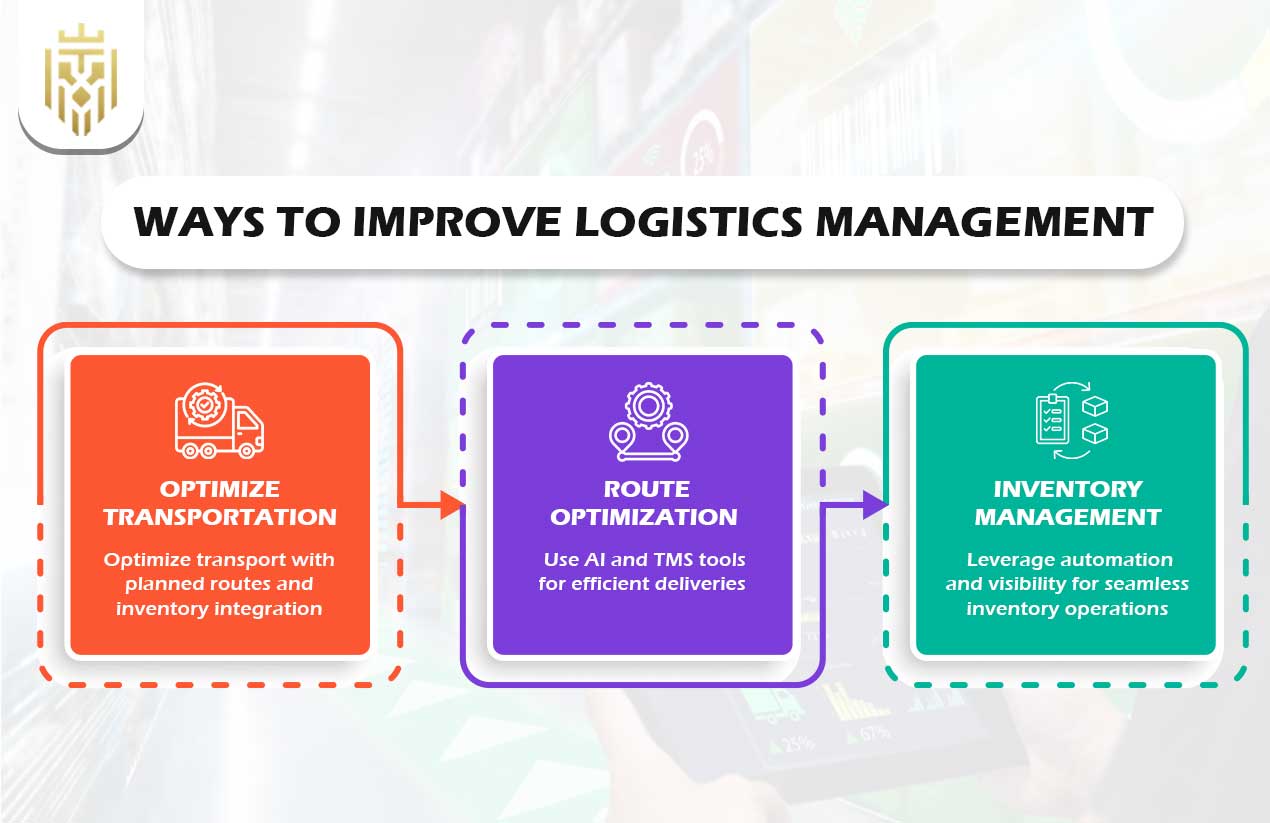
Transportation:
Effective transport and logistics management involves route optimization, safety considerations, and cost-effective packaging. Planning ahead and integrating inventory tracking with real-time data tools ensures a smooth flow of goods across the supply chain logistics.
Route optimization:
Route optimization is the use of advanced algorithms, AI, and TMS tools to analyse delivery routes and calculate the best mix between cost, efficiency, and priority.This critical logistics solution is particularly beneficial for operations in both the last mile logistics and e-commerce logistics.
Inventory management:
If you want to optimize your inventory, apply demand forecasting, automation and relationships with suppliers. Logistics solutions enable visibility in supply chain logistics, reduce costs, prevent stock outs, and ensure smooth shipping and logistics operations.
FAQs
-
What do you mean by Logistics Management?
Logistics management involves planning, coordinating, and optimising the movement and storage of goods across the supply chain, focusing on cost-efficiency, timely deliveries, and customer satisfaction to ensure operational excellence in transport and logistics.
-
What are the 7 functions of Logistics Management?
The seven functions of logistics management are order processing, material handling, demand forecasting, packaging, inventory management, transportation, and order fulfilment, each ensuring smooth shipping and logistics across supply chain logistics operations.
-
What are the types of Logistics Management?
Key types of logistics management include supply chain management, product management, returns management, customer service, and distribution/material handling, focusing on efficient movement, storage, and delivery within e-commerce logistics and retail logistics sectors.
-
What is the importance of Logistics Management?
The importance of logistics management lies in protecting goods, optimising costs, enhancing routing, and improving efficiency. It ensures smooth supply chain logistics and supports operations like last mile logistics for better profitability and customer satisfaction.

